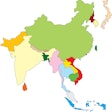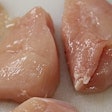There is one task for me that will never be considered work. As we did this weekend, I saddled up with my 10-year-old daughter (she went bareback) and we used horses to move cows in the pasture. This, for me, is the ideal day on the ranch.
Because so many of my dearest friends in the ranching world have done this for generations and share my love for the land and livestock, it is really hard to consider meat coming from a petri dish instead of a pasture.
Taste-testing took place at the University of Maastricht in the Netherlands for a hamburger grown in a petri dish. Now they are apparently working to conquer the technique to produce mass quantities of meat by culturing a single stem cell from a bovine animal.
In the past week I have actually gotten into quite a few discussions with my fellow cowboys about the merits of such research. I contend that if we support the science and technology that has allowed us to double total beef production in the past 50 years with the same number of animals, it is just a little hypocritical to say this is not natural.
We need to ask ourselves, for starters: How natural is artificial insemination or embryo transfer or cloning?
What I don’t like about the discussion is when people claim that we need lab meat to protect the planet. Research has documented that animals improve the planet, but that little nugget of information does not seem to surface often enough.
Allen Savory’s research has proven that to prevent desertification of the planet, we need more grazing, not less. In fact, the most amazing thing I have personally witnessed is Globe, Ariz. A mountain of mine tailings that were a burden to the town and nothing but a sterile pile of dust was turned into the most fertile soil in Arizona, thanks to cows.
Like all things on this planet, when they are managed by humans they are improved.
So while I support science and do not think that meat produced in a lab will replace all food animals, I think we need to be open minded about how we can truly produce more food with fewer resources in the future. There are still millions of hungry people in the world.
So now we can either sit here whining about what can’t be done or we can saddle up and do it better than we did before.
There is one task for me that will never be considered work. As we did this weekend, I saddled up with my 10-year-old daughter (she went bareback) and we used horses to move cows in the pasture. This, for me, is the ideal day on the ranch.
Because so many of my dearest friends in the ranching world have done this for generations and share my love for the land and livestock, it is really hard to consider meat coming from a petri dish instead of a pasture.
Taste-testing took place at the University of Maastricht in the Netherlands for a hamburger grown in a petri dish. Now they are apparently working to conquer the technique to produce mass quantities of meat by culturing a single stem cell from a bovine animal.
In the past week I have actually gotten into quite a few discussions with my fellow cowboys about the merits of such research. I contend that if we support the science and technology that has allowed us to double total beef production in the past 50 years with the same number of animals, it is just a little hypocritical to say this is not natural.
We need to ask ourselves, for starters: How natural is artificial insemination or embryo transfer or cloning?
What I don’t like about the discussion is when people claim that we need lab meat to protect the planet. Research has documented that animals improve the planet, but that little nugget of information does not seem to surface often enough.
Allen Savory’s research has proven that to prevent desertification of the planet, we need more grazing, not less. In fact, the most amazing thing I have personally witnessed is Globe, Ariz. A mountain of mine tailings that were a burden to the town and nothing but a sterile pile of dust was turned into the most fertile soil in Arizona, thanks to cows.
Like all things on this planet, when they are managed by humans they are improved.
So while I support science and do not think that meat produced in a lab will replace all food animals, I think we need to be open minded about how we can truly produce more food with fewer resources in the future. There are still millions of hungry people in the world.
So now we can either sit here whining about what can’t be done or we can saddle up and do it better than we did before.
Because so many of my dearest friends in the ranching world have done this for generations and share my love for the land and livestock, it is really hard to consider meat coming from a petri dish instead of a pasture.
Taste-testing took place at the University of Maastricht in the Netherlands for a hamburger grown in a petri dish. Now they are apparently working to conquer the technique to produce mass quantities of meat by culturing a single stem cell from a bovine animal.
In the past week I have actually gotten into quite a few discussions with my fellow cowboys about the merits of such research. I contend that if we support the science and technology that has allowed us to double total beef production in the past 50 years with the same number of animals, it is just a little hypocritical to say this is not natural.
We need to ask ourselves, for starters: How natural is artificial insemination or embryo transfer or cloning?
What I don’t like about the discussion is when people claim that we need lab meat to protect the planet. Research has documented that animals improve the planet, but that little nugget of information does not seem to surface often enough.
Allen Savory’s research has proven that to prevent desertification of the planet, we need more grazing, not less. In fact, the most amazing thing I have personally witnessed is Globe, Ariz. A mountain of mine tailings that were a burden to the town and nothing but a sterile pile of dust was turned into the most fertile soil in Arizona, thanks to cows.
Like all things on this planet, when they are managed by humans they are improved.
So while I support science and do not think that meat produced in a lab will replace all food animals, I think we need to be open minded about how we can truly produce more food with fewer resources in the future. There are still millions of hungry people in the world.
So now we can either sit here whining about what can’t be done or we can saddle up and do it better than we did before.
There is one task for me that will never be considered work. As we did this weekend, I saddled up with my 10-year-old daughter (she went bareback) and we used horses to move cows in the pasture. This, for me, is the ideal day on the ranch.
Because so many of my dearest friends in the ranching world have done this for generations and share my love for the land and livestock, it is really hard to consider meat coming from a petri dish instead of a pasture.
Taste-testing took place at the University of Maastricht in the Netherlands for a hamburger grown in a petri dish. Now they are apparently working to conquer the technique to produce mass quantities of meat by culturing a single stem cell from a bovine animal.
In the past week I have actually gotten into quite a few discussions with my fellow cowboys about the merits of such research. I contend that if we support the science and technology that has allowed us to double total beef production in the past 50 years with the same number of animals, it is just a little hypocritical to say this is not natural.
We need to ask ourselves, for starters: How natural is artificial insemination or embryo transfer or cloning?
What I don’t like about the discussion is when people claim that we need lab meat to protect the planet. Research has documented that animals improve the planet, but that little nugget of information does not seem to surface often enough.
Allen Savory’s research has proven that to prevent desertification of the planet, we need more grazing, not less. In fact, the most amazing thing I have personally witnessed is Globe, Ariz. A mountain of mine tailings that were a burden to the town and nothing but a sterile pile of dust was turned into the most fertile soil in Arizona, thanks to cows.
Like all things on this planet, when they are managed by humans they are improved.
So while I support science and do not think that meat produced in a lab will replace all food animals, I think we need to be open minded about how we can truly produce more food with fewer resources in the future. There are still millions of hungry people in the world.
So now we can either sit here whining about what can’t be done or we can saddle up and do it better than we did before.


















